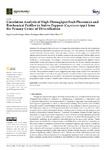Correlation Analysis of High-Throughput Fruit Phenomics and Biochemical Profiles in Native Peppers (Capsicum spp.) from the Primary Center of Diversification

Use este enlace para citar
http://hdl.handle.net/2183/27759
A non ser que se indique outra cousa, a licenza do ítem descríbese como Atribución 4.0 Internacional
Coleccións
- Investigación (FCIE) [1225]
Metadatos
Mostrar o rexistro completo do ítemTítulo
Correlation Analysis of High-Throughput Fruit Phenomics and Biochemical Profiles in Native Peppers (Capsicum spp.) from the Primary Center of DiversificationData
2021-01-30Cita bibliográfica
González-López, J.; Rodríguez-Moar, S.; Silvar, C. Correlation Analysis of High-Throughput Fruit Phenomics and Biochemical Profiles in Native Peppers (Capsicum spp.) from the Primary Center of Diversification. Agronomy 2021, 11, 262. https://doi.org/10.3390/agronomy11020262
Resumo
[Abstract] The main goal of this work was to investigate the relationship between the fruit morphology and biochemical composition of peppers (Capsicum spp.). For that purpose, one hundred native varieties from the Andean region, where the genus Capsicum has its origin, were analysed for different phytochemical compounds. In addition, pepper fruits were assessed with the highly precise phenomics tool Tomato Analyzer. The collection showed a broad variability which was more evident within the C. annuum group. On average, C. frutescens accessions displayed the highest levels of solid soluble content, pH, polyphenols and antioxidant activity. The Tomato Analyzer descriptors under the categories of size, shape index, and latitudinal section, mostly contributed to the variance among Capsicum groups. C. annuum hold the larger fruits, whereas C. frutescens comprised fruits of smaller sizes. The correlation analysis revealed that biochemical traits were negatively correlated with the fruit parameters related to size, suggesting that huger fruits contain lower amounts of chemical metabolites. The multivariate approximations demonstrated that Andean peppers assorted according to morphometric and colorimetric characteristics, but independently of their species or geographical origin. Groups of valuable native varieties carrying promising traits were identified.
Palabras chave
Solid soluble content
Acidity
Antioxidant capacity
Polyphenols
Tomato analyzer
Correlation analysis
Acidity
Antioxidant capacity
Polyphenols
Tomato analyzer
Correlation analysis
Versión do editor
Dereitos
Atribución 4.0 Internacional
ISSN
2073-4395






